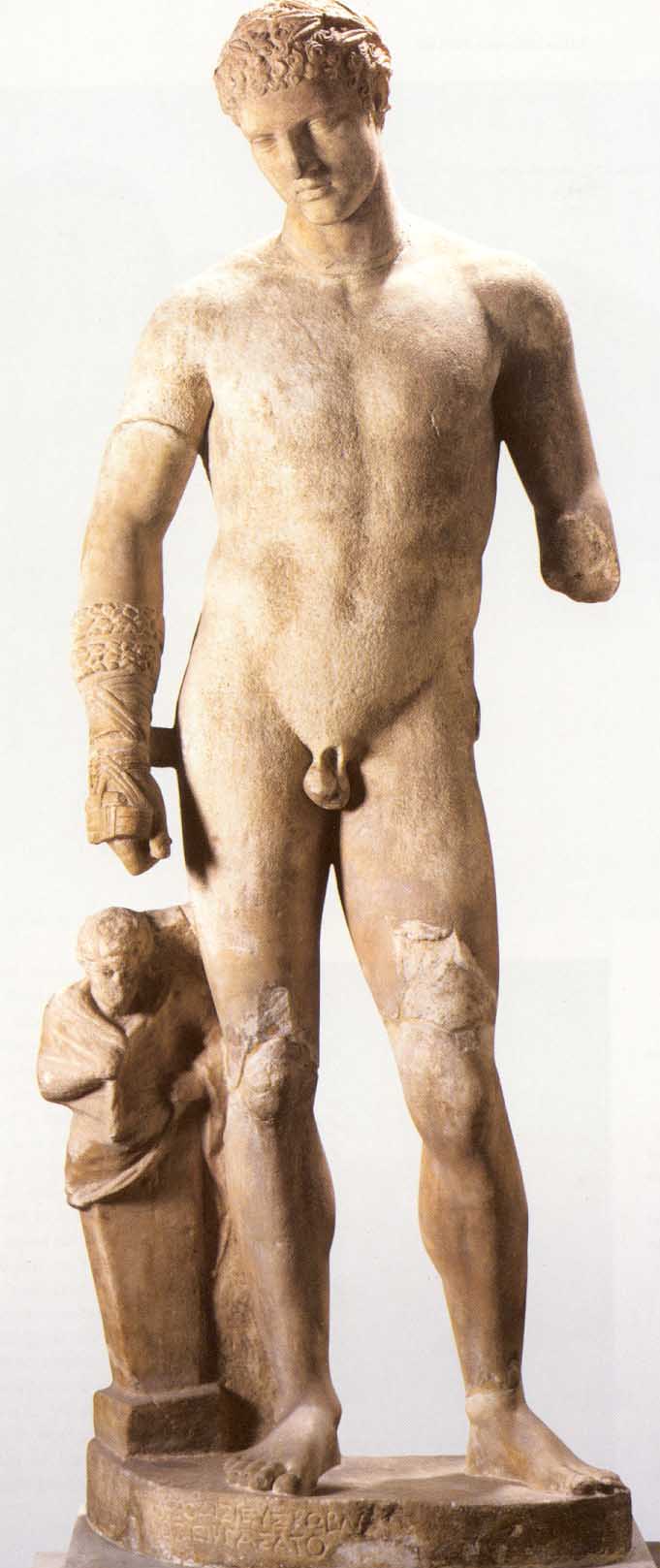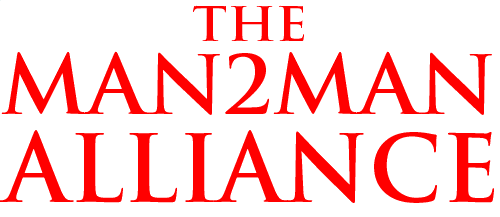




and the weight of the lies

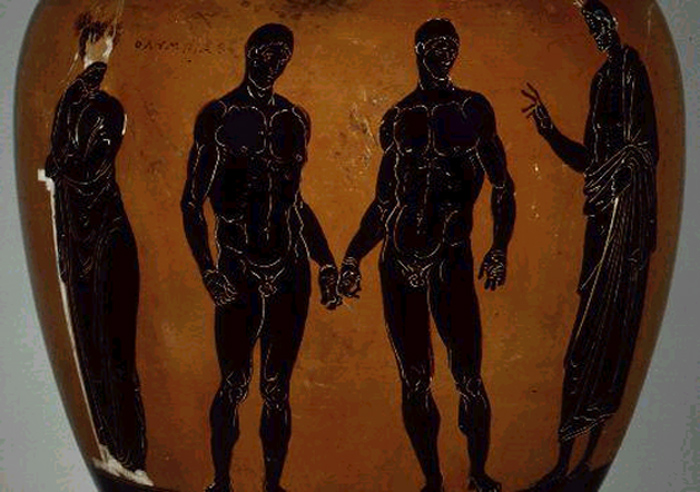
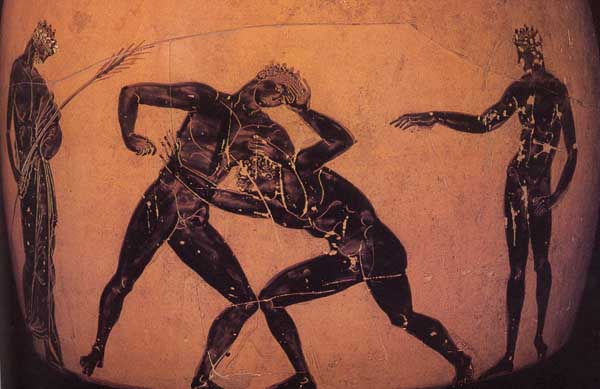







and the weight of the lies





the weight of the lies
5-28-2006
When will such boys become MEN? When will MEN conquer their castles again? When will MEN no longer be afraid to establish primary relationships with other MEN and to hell with all the HOMOPHOBIA? -- Robert Loring.
On this site and in our Man2Man Alliance, we address two lies.
The first, which comes out of present-day gay male culture, is that only a relatively few males are attracted to other men, and that those males are all into anal penetration, promiscuity, and effeminacy.
That's a lie.
The other lie, which comes out of contemporary "straight" culture, is that real men are not attracted to, nor do they have sex with, other real men.
That too is a lie.
The first lie, the gay lie, is nowadays, in form, rather blatant.
As has been said, the love which once dared not speak its name now shouts from the rooftoops.
Not only are prominent members of society openly gay, but they're openly into anal and promiscuity.
And often effeminate as well.
But the second lie often takes more subtle forms.
Since it's no longer politically correct to discriminate against openly gay men, after all, people have to be careful in their condemnations of homosexuality.
That's particularly true in the academy -- that is, among academics, people who teach and publish in the universities and colleges.
I had reason to reflect upon that recently while reading a book by classicist Michael Grant.
Grant, who was born in 1914 and died in 2004, was a prolific writer about the ancient world.
According to his obit in the London Times, he "wrote and edited more than 50 books of nonfiction and translation."
And he was an academic as well, having trained at Trinity College, Cambridge, and having taught in a number of universities, including Cambridge, Edinburgh, and Queen's University, Belfast.
Grant was married, and had children -- which mattered in the world of the classics in Grant's era.
It was protection.
Grant's first book was published in 1946.
At the time, it was virtually impossible for anyone to discuss homosexuality openly.
And certain classes of academics -- such as classicists and art historians -- had to be very careful about saying anything at all.
Most took the easy way out, and simply said nothing.
Which was by far the safest thing to do, even if ridiculous when looking at the ancient world and in particular the Greeks.
Nevertheless, it was common.
For example, in a book from my college days titled The Ancient Greeks, by Chester G Starr of the University of Michigan, there's NO mention of homosexuality.
There is mention of Harmodius and Aristogeiton.
They're called "the tyrant-slayers."
But NO MOTIVE is given for their act.
Which is pretty silly, given that every ancient Greek historian discussed exactly and precisely what happened and why.
Some authors did acknowledge homosexuality among the Greeks, only to dismiss it as a fringe phenomenon.
For example, in a 1967 book titled, of all things, Greek Realities, by one Finley Hooper of Wayne State University, the author, while decrying the notion that Sappho may have been a Lesbian, does admit to some homosexuality among the Greeks, beginning with "Achilles' shameless grief for Patroclus"; but then suggests that Greek writing about homosex was primarily literary in nature and had nothing to do with what he calls -- and I'm not making this up guys -- "the man in the street."
Of course that's not true -- to put it mildly.
And one has to wonder what it cost Mr. Finley to so falsely and brazenly lie.
All this changed, however, in 1978, when K. J. Dover published his groundbreaking work, Greek Homosexuality.
Dover had two claims to authority in this area.
The first was that he was, he said, heterosexual.
The second was that he was an acknowledged and highly-regarded expert in the field of Greek vase paintings, of which there are thousands, and which serve as one of the most important records of Greek life and Greek homosex.
Dover's conclusions were that homosexuality was widespread among the Greeks, and that the Greeks viewed homosexuality as a social good.
What's all this have to do with Michael Grant?
My memory of Michael Grant's work was that it was homophobic in a way typical of its era.
Remember that Grant's first book was published in 1946 and that Grant was 64 when Dover published.
However, Grant was unusually prolific, and continued to write almost up until his death in 2004.
Recently, I began reading one of Grant's later works, titled The Founders of the Western World, and published in 1991.
At first, I was pleasantly surprised by his discussion of Sparta and the agogé:
This was the complex of communal, totalitarian, socio-military institutions (associated with the name of the perhaps mythical lawgiver Lycurgus) which gave the Spartans their subsequent austere reputation. Examined soon after birth, all Spartan infants, if weak or deformed, were thrown over a cliff and killed. Those [males] who survived, at the age of seven or eight, were removed from their families and drafted into a 'herd' [known as the herd of young bull calves], under the control of a senior Spartiate [full-fledged Spartan citizen]. And for the next two decades they worked their way through a brutalizing series of state-oriented training programmes. During the course of this period, at the age of about twenty, they became eligible for one of the Spartan messes or dining clubs, each of which possessed about fifteen members. Their food was awful, but each member had to pay a mess-bill; and failure to pay -- or, for that matter, to endure the severities of the training curriculum -- resulted in deprivation of Spartiate status.
When these young men joined the Assembly, at the age of thirty, they had become ruthless, taciturn and unquestioning. Their predominant ethos was homosexual, but they were expected to marry in order to produce children. Their brides had to undergo a macabre wedding ceremony. Subsequently, however, the barrack-room existence to which their husbands were tied left these women a good deal to themselves. Moreover, their biological role as bearers of Sparta's children did not go unrecognized, so that they enjoyed unusual day-by-day and legal freedom. ...
[emphasis mine]
Now, I said I was pleasantly surprised by this passage.
And that's because it was the first time I'd seen Grant acknowledge widespread homosexuality among the Greeks.
And his description of the agogé -- the training regimen for Spartan males -- and of Spartan society -- even if a tad overblown (the food wasn't that bad and the wedding ceremony not that strange), seemed on target to me.
What should have given me pause however, was this line:
"Their predominant ethos was homosexual, but they were expected to marry in order to produce children."
Because of course, with those words, Grant, not unlike Dan Savage, is suggesting that one can't expect men involved in same-sex relationships to also be involved with women.
I didn't really catch his drift when I first read it.
Foolish me.
I then came across this passage:
The Greek sculptors' principal theme was the masculine nude (kouros), depicting Apollo or his servants but also reflecting the dominant role of naked males in Greek daily life.
[emphasis mine]
That's correct, and again I was pleased, for this was the first time I'd seen Grant acknowledge that male nudity was not simply an artistic convention, but reflected a Greek reality: the dominant role of naked males in Greek daily life.
But then there was this:
... [Greek] women everywhere lacked control of their own affairs, remaining under the care, legally speaking, of a male, without the right to possess or dispose of property on their own account.
...
These restrictive attitudes to women promoted a Greek society that was markedly homosexual. Again, customs differed considerably from [city] state to state, but in most Greek communities the women were kept at home and the men spent their day with other Greek men or boys. Artists, as we saw, paid special attention to the nude masculine form; and pederasty abounded. It was far more favoured than homosexual relations between men and youths of the same age, and indeed a whole philosophy was built up round the pederastic situation, founded on the concept that the lover was his beloved's educator and military trainer. Official attitudes to the physical, homosexal sex-act varied, although, in general, the younger partner was expected to resist or evade such physical advances for as long as possible.
This, guys, is a series of huge, whopping, lies.
And quite breathtaking.
But at the same time discouraging.
Which is why I titled this post, "the weight of the lies."
Because it feels like for every movement forward, there are two steps back.
I don't know how long it took Grant to acknowledge Greek homosexuality, though I'm assuming that he did so post-1978.
In which case it took him at least thirty years into his published work to admit that homosexuality was part of the warp and woof of Greek society.
But look at what we've got.
First of all, he in effect blames Greek male homosexuality on "restrictive attitudes to women."
Earth to Dr. Grant:
Until very, very, very recently, "restrictive attitudes to women" were the almost universal norm.
There are a variety of reasons for that, but the first and foremost was that women were -- and are -- needed to bear children.
Mortality rates were high, infant mortality was huge, and in order for the race to continue, women had to keep pumping out kids.
Men were protective towards women -- because they are so by nature, and because they had to be.
Women bear the future of the race.
It's only extremely recently that a combination of advances in medicine, the creation of labor-saving devices, and of course birth-control, have enabled women to be free of their exclusive focus on child-bearing.
If "restrictive attitudes to women promoted a society that was markedly homosexual," ALL societies prior to the 20th century would have been markedly homosexual.
Now, of course, it can be argued, that homosexuality among men has been historically very common -- the norm.
And indeed I do argue that.
But -- homosexuality among men is not dependent upon "restrictive attitudes to women."
We know that because homosexuality among men is common in our own era.
Despite the relative absence of "restrictive attitudes to women'; and it's common among men who are very fond of women -- sexually and otherwise.
Grant's idea is a return to that 1950s theory I've written about before (in the tiny and stable message thread) called "situational homosexuality," which posits that men turn to other men only in the absence of women.
But the reality in ancient Greece was that not only did these men have wives, but that female prostitutes and slaves were abundant.
These men were not suffering from an absence of women.
Indeed, it's clear that Greek men had a lot of sex with women; and that many Greek men were very devoted to their wives.
Including guys like the Theban hero Pelopidas, guys who were clearly and simultaneously involved in same-sex relationships.
Of course, most of these men didn't get to choose their wives -- they were in arranged marriages; whereas they did get to choose their male lovers.
But what a man like Grant declines to understand is that heterosex and homosex are not mutually exclusive.
And that's a huge failing.
MEN are SEXUAL.
If you make it possible for MEN to love each other without guilt or fear -- that's what they'll do.
And that's precisely what the Greeks did.
Next up:
"in most Greek communities the women were kept at home and the men spent their day with other Greek men or boys."
Again, this is common among human beings.
Throughout history, and until very very recently, most men spent the bulk of their time with other men and boys.
"Artists, as we saw, paid special attention to the nude masculine form; "
That's true.
"pederasty abounded. It was far more favoured than homosexual relations between men and youths of the same age,"
That is NOT true.
The emphasis among the Greeks on what anthropologists call "age-structured" relationships -- in which one male must be older than the other -- has been greatly overstated.
And though it's difficult to know exactly what Grant means by pederasty, by not defining the term he makes it sound like 40 year old men pursuing 12 year old boys.
The reality was very different.
When we look at the vase paintings and the sculptural groups, not to mention the literary record, what we see is that though there is often an age difference depicted, it's usually slight.
Yes, there are some depictions of mature men -- indicated by a full beard -- courting boys who look no older than 12 or 13.
But most of what you see is guys who are very close in age.
Let's look at the some of the pictorial evidence.
This is Achilles and Patroclus, who without question were the most important mythical model for warrior lovers in classical Greece.
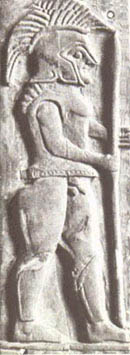 12345678910
12345678910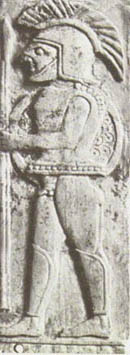
Spartan Hoplites
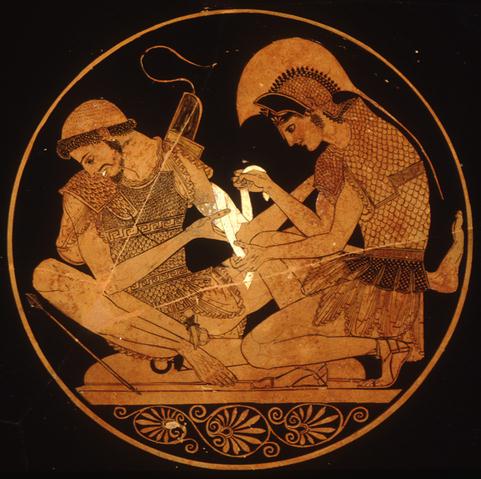
Yes, Patroclus has a beard, supposedly indicating that he's older than Achilles.
But it's a young man's beard.
Clearly, these are two guys who are very close in age.
Which they were mythically -- they were cousins who grew up together.
Remember Prof. Finley Hooper's gibe about "Achilles' shameless grief for Patroclus"?
What's shameful is Hooper's denigration of their relationship and the meaning it had for the Greeks.
Here's Aristogeiton, on the left, and Harmodius.
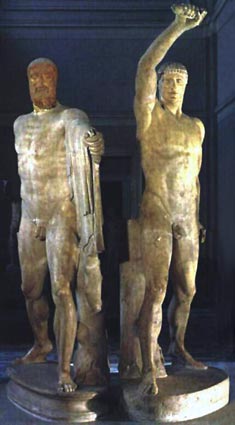
These were real people, and these statues were erected about five years, we're told, after their deaths.
Presumably, then, this is what they looked like.
Yes, Aristogeiton has a beard and is older than Harmodius.
But Harmodius is not a kid.
He's at least 18, and appears to me to be in his early 20s.
Aristogeiton might be 30.
I doubt he was much older -- his body is superb.
And in that era, people aged rapidly after 30.
Life expectancy was 35 in the best of times.
Which is another reason the term "pederasty" is misleading.
Here are two hoplites who died in battle together and were buried together:
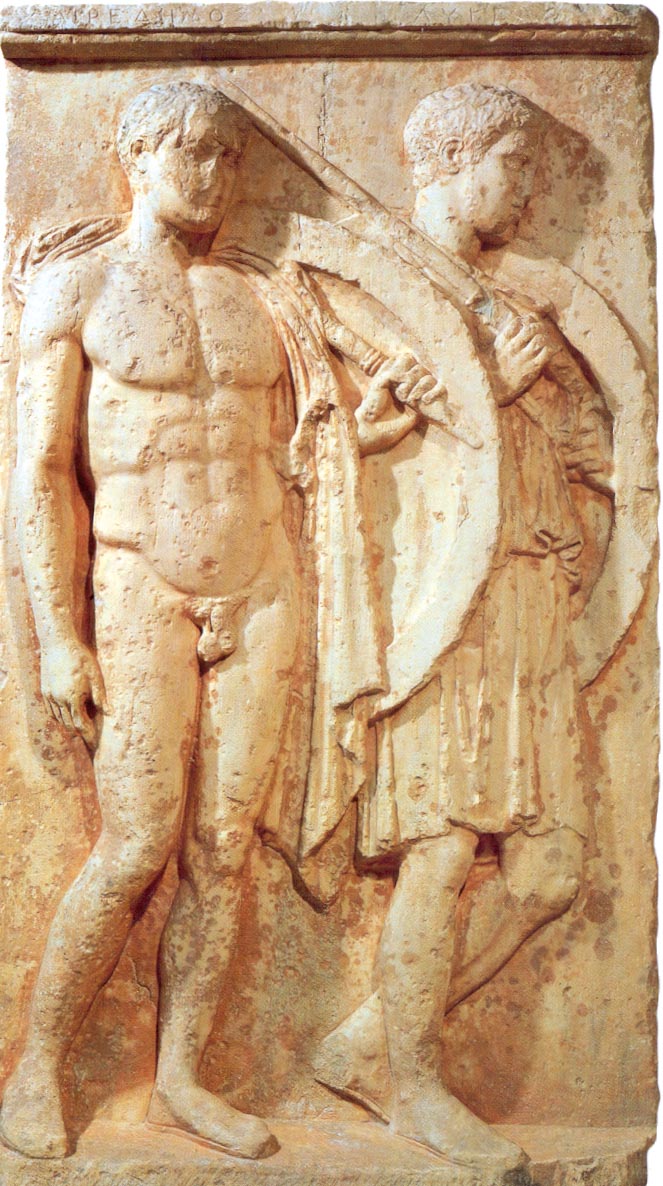
Again, one has a beard and the other doesn't.
But they're both physically mature men.
The difference in age appears slight.
Here are two youths kissing:
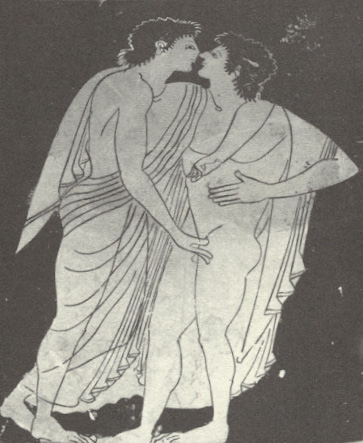
This is NOT pederastic.
These are both teenaged boys -- the difference in age is minimal.
Here's another:
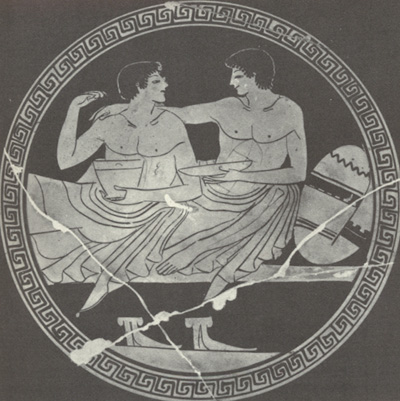
These are two youths at a symposium -- an all-male dinner party.
They're courting -- and they're clearly the same age.
I could go on and on and on and on with these.
Once again, here's Grant's statement:
"pederasty abounded. It was far more favoured than homosexual relations between men and youths of the same age,"
Look at the evidence.
He's wrong.
He's lying to make the homosex appear entirely "other."
When in reality, it was the most natural thing in the world.
Next:
"indeed a whole philosophy was built up round the pederastic situation, founded on the concept that the lover was his beloved's educator and military trainer."
This is a tad more accurate, though we can dispense with the word "pederastic."
These relationships were not supposed to just be physical.
They were very romantic and involved reciprocal responsibilities.
Once again, "educator and military trainer" I think goes too far.
Those were separate categories -- educators, actually, were often slaves.
But certainly the men were supposed to be there for each other.
And if one was older, he was supposed to set an example.
Nothing wrong with that.
Next:
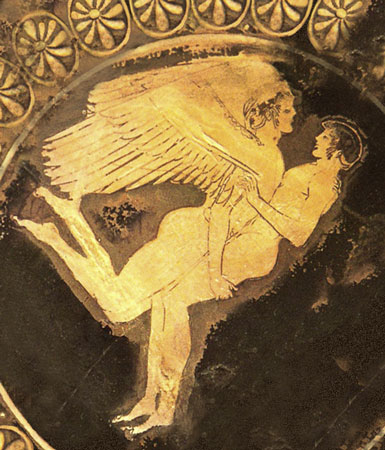
|
Does Hyacinthus look like he's evading Zephyros? |
"Official attitudes to the physical, homosexal sex-act varied,"
Just what "homosexual sex-act" does Grant refer to?
He's being coy, but if he's read Dover, he knows that frottage was supported and anal denigrated.
"although, in general, the younger partner was expected to resist or evade such physical advances for as long as possible."
NO.
That's just silliness.
There was supposed to be a courtship.
When the two men had accepted each other, they had sex.
As you can see from this vase painting of the godling Zephyros and his bud Hyacinthus.
The younger man is clearly enjoying what's happening.
He's not evading anything.
To repeat: When the two men had accepted each other, they had sex.
End of discussion.
Now, what about the military use of erotically-bonded warriors?
This is where all the emphasis on "pederasty" gets blown way out of the water.
You've heard me speak of the Sacred Band of Thebes -- see for example, the Amor Masculus and WARRIORS! message threads.
Thebes, like Athens and Sparta, and about a thousand others, was a Greek city-state.
It was frequently at war with Athens or Sparta, and sometimes both.
And with their allies.
War was serious.
The defeated could be killed or enslaved, as could their families.
Entire cities were razed to the ground and the inhabitants killed or sold off.
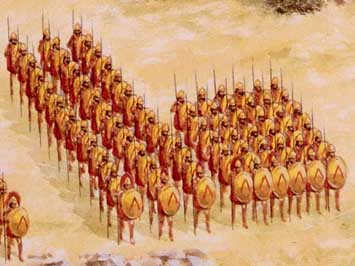
|
spartan battle drill |
Warfare was hoplite warfare, which I've described at length in my article titled Hoplites.
Hoplite warfare was strenuous.
The hoplite panoply -- helmet, breastplate or cuirass, greaves, shield, sword, and spear -- was heavy.
And the actual fighting was extremely physical.
There was a clash of two lines of warriors standing shoulder to shoulder.
The line which could push down or otherwise break through the opposing line, won.
Here's how I describe such warfare in Hoplites:
...hoplites stood tightly shoulder-to-shoulder, positioned so that the shield of the man on the right protected the spear hand of the warrior on his left. This line of soldiers, grouped with others in orderly rows in a phalanx, advanced in lock step toward the opposing line. No individual could stand up to such a formation. Instead, the antagonists organized into a similar line, and marched forward until the two armies collided violently, with a force so great that shields often buckled from the impact. While the front lines stabbed furiously at each other in what contemporaries described as a "storm of spears," the lines of soldiers behind pushed forward those in front, and what ensued was basically a shoving match, until one line gave way and the other simply cruised over its remnants.
Victory was dependent upon preserving an unbroken line, and so it was crucial that during that storm of spears and violent collision of shields hoplites remain, as Sophocles said, "true and noble standing at each other's side." For once the line was broken, it was easily defeated, as it disintegrated into individual soldiers who could be pursued and killed. But an unbroken line was unstoppable, and could move forward over the battlefield crushing all opposition.
So cohesion was paramount. The single most important act in war was to stand tight with your fellow warrior, to be so bonded with him that nothing would make you leave his side.
I said that "cohesion was paramount."
And that's clearly true.
But something else mattered.
And that was brute physical strength.
Because you were trying to push through the opposing line of soldiers.
And they were pushing back.
Now, we know both from painting and sculpture, and from the literary record, that there were a huge number of erotically-bonded warrior pairs.
And that's what the Sacred Band of Thebes was -- 150 erotically-bonded warrior pairs -- 300 men.
Could such pairs have been "pederastic?"
No.
A twelve or fourteen year old boy would have been useless in hoplite battle.
The "youth" would have had to have been at least 18, or older.
Indeed, when the Thebans took out the Spartans at the battle of Leuctra, it's thought that part of the equation was physical size.
The Thebans were farmers.
And that sort of life selects for big guys.
The Spartans, by contrast, used slaves to work their farms.
Further, we know that the Thebans had been beating the Spartans in wrestling when the Spartans were occcupying Thebes.
And there is an aspect of hoplite warfare which involves trying to throw the opposing soldier down so that you can trample him and stab him.
Here's Plutarch's description of the battle of Leuctra -- Pelopidas is the commander of the Sacred Band of Thebes, Epaminondas is his bosom companion and probably lover and in over-all command of the Thebans and their allied forces:
Pelopidas, with the three hundred [men of the Sacred Band of Thebes] came rapidly up, before [the Spartan commander] could extend his line, and close up his divisions, and so fell upon the Spartans while in disorder; though the Lacedaemonians, the expertest and most practiced soldiers of all mankind, used to train and accustom themselves to nothing so much as to keep themselves from confusion upon any change of position, and to follow any leader, or right-hand man, and form in order, and fight on what part soever dangers press.
In this battle, however, Epaminondas with his phalanx, neglecting the other Greeks, and charging them alone, and Pelopidas coming up with such incredible speed and fury, so broke their courage and baffled their art that there began such a flight and slaughter amongst the Spartans as was never before known.
And so Pelopidas, though in no high office, but only captain of a small band, got as much reputation by the victory as Epaminondas, who was general and chief captain of Boeotia.
That was not done with barely pubescent teenagers.
It was done with grown men.
Some of them may have been in their late teens.
But they had to be physically big enough to break the Spartan line and then slaughter them.
The weight of the lies:
What Grant, one of the most prolific and widely-read classicists, puts forth, is that Greek homosex was the result of "restrictive attitudes towards women"; and that "pederasty abounded."
Neither statement holds up under scrutiny.
Forget "restrictive attitudes towards women."
Yes, Greek women were expected to stay at home, where they could bear and raise children.
So what?
That was the virtually universal situation of women until the past century.
The Greek reality is, as Grant acknowledges, that women in Sparta and other places had considerable freedom; that female characters are among the most powerful in Greek tragedy and in comedy; that of course there's a pantheon of gods and goddesses; that women had a signficant role in Greek religious ritual; and that some women did become politically and otherwise powerful.
Let's look again at the vase painting which I put at the top of this page:

Who are these people?
The two figures in the center are boxers, about to begin a bout.
On the right is the referree.
And on the left is the goddess Olympia -- the goddess of the Olympic games -- who is observing the bout.
How misogynist is that?
If Greek men hated women and wanted to create a "homosexual" society -- a 20th century idea which was completely unknown and indeed alien to them -- would they have put this woman in this otherwise MALE scene?
Of course not.
Ares, god of war, or someone like him, would be there.
The Greek attitude -- towards sex and towards men and towards women -- was far more balanced than men like Grant will ever admit.
Forget "restrictive attitudes towards women."
And forget pederasty.
It's been over-emphasized.
What Grant doesn't say, but which is apparent from both the pictorial and literary record, is the intense passion which men felt for each other.
I believe that what Greek men did was create a society in which it was possible for MEN to openly and passionately love each other.
And that's what they did.
And it was glorious.
WHY DOES NO ONE, OTHER THAN ME, EVER TALK ABOUT THAT?
Instead, it's all about those dreadful misogynist Greek men, who restricted women.
And who focused their unwanted erotic attentions upon boys.
NOT TRUE.
And when I say THE WEIGHT OF THE LIES -- that's what I mean.
Grant puts forth a number of lies about Greek homosexuality.
But his biggest lie is a lie of omission.
Because he does not talk about the glory and power to be found in the love of MAN for MAN.
Why?
Plutarch puts a lot of energy into describing the extraordinarily stirling characters of both Pelopidas and Epaminondas.
He says for example that Pelopidas, who'd inherited a considerable estate, used it to better the situation of the poor in Thebes;
but amongst all his friends he could never persuade Epaminondas to be a sharer in his wealth. He, however, stepped down into his [Epaminondas'] poverty, and took pleasure in the same poor attire, spare diet, unwearied endurance of hardships, and unshrinking boldness in war; like Capaneus in Euripides, who had --
abundant wealth and in that wealth no pride
he was ashamed that any one should think that he spent more upon his person than the meanest Theban.
Epaminondas made his familiar and hereditary poverty more light and easy by his philosophy and single life; but Pelopidas married a woman of good family and had children ...
Both seemed equally fitted by nature for all sorts of excellence; but bodily exercises chiefly delighted Pelopidas, learning Epaminondas; and the one spent his spare hours in hunting and the Palaestra, the other in hearing lectures or philosophising. And, amongst a thousand points for praise in both, the judicious esteem nothing equal to that constant benevolence and friendship, which they inviolably preserved in all their expeditions, public actions, and administration of the commonwealth. For if any one looks on the administrations of Aristides and Themistocles, of Cimon and Pericles, of Nicias and Alcibiades, what envy, what mutual jealousy appears? And if he then casts his eye on the kindness and reverence that Pelopidas showed Epaminondas, he must needs confess that these are more truly and more justly styled colleagues in government and command than the others, who strove rather to overcome one another than their enemies.
The true cause of this was their virtue; whence it came that they did not make their actions aim at wealth and glory, an endeavour sure to lead to bitter and contentious jealousy; but both from the beginning being inflamed with a divine desire of seeing their country glorious by their exertions, they used to that end one another's excellences as their own. Many, indeed, think this strict and entire affection is to be dated from the battle at Mantinea, where they both fought, being part of the succours that were sent from Thebes to the Lacedaemonians, their then friends and allies. For, being placed together among the infantry, and engaging the Arcadians, when the Lacedaemonian wing, in which they fought, gave ground, and many fled, they closed their shields together and resisted the assailants.
Pelopidas, having received seven wounds in the forepart of his body, fell upon an heap of slain friends and enemies; but Epaminondas, though he thought him past recovery, advanced to defend his arms and body, and singly fought a multitude, resolving rather to die than forsake his helpless Pelopidas.
And now, he being much distressed, being wounded in the breast by a spear, and in the arm by a sword, Agesipolis, the King of the Spartans, came to his succour from the other wing, and beyond hope delivered both. ...
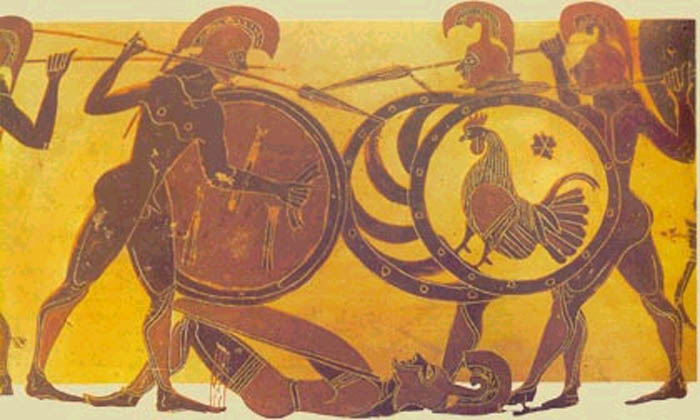
Defending a fallen comrade
I repeat -- why doesn't Grant mention this sort of male-male devotion?
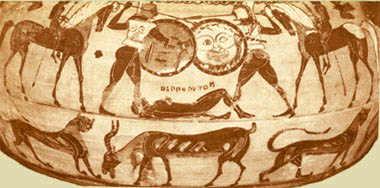
Defending a fallen comrade -- a common scene in vase painting
I repeat again -- why doesn't Grant mention this sort of male-male devotion?
Why??
WHY???
What is he afraid of?
Robert Loring:
When will such boys become MEN? When will MEN conquer their castles again? When will MEN no longer be afraid to establish primary relationships with other MEN and to hell with all the HOMOPHOBIA?


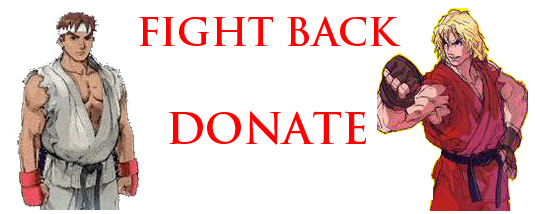
© All material Copyright 2006 by Bill Weintraub. All rights reserved.
Re: Natural Masculinity and the weight of the lies
5-29-2006
Great post Bill!! Your knowledge of ancient Greece is fantastic.
Bill G
Re: Natural Masculinity and the weight of the lies
8-7-2006
Thank you Bill G.
Since this post went up torwards the end of May 2006, we've started talking a great deal about two key concepts:
1. Heterosexualization -- the elimination, during and after the industrial revolution in the West, of all-male spaces, and the enforced mixing of the sexes.
2. Natural masculinity -- Masculinity as it develops naturally among boys and men who have frequent access to all-male spaces as they're growing up; and who are allowed and encouraged to have same-sex relationships.
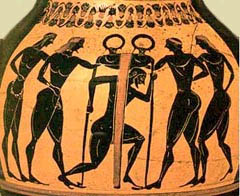
These are some excerpts from a letter from my foreign friend where he talks about these concepts:
Masculine male groups and bonds play an extremely important role in the development of physical, mental, emotional and social aspects of natural masculinity. As such they are an important part of the positive environment that all masculine identified boys should have. An otherwise masculine identified man who is deprived of membership in a masculine male group / bond during his growing years will be less than 1/4th naturally masculine than if he had such an opportunity. Masculine identified boys have a natural tendency to seek to join male-only groups, and it's their natural right.
The masculinity of men flows from their group. It's like their natural masculinity combines and gets manifold when masculine identified men unite. The camaraderie, mutual understanding, support, playing together, learning the ways of the world as a male, dealing with roughs and toughs of life together --- they all help to develop the natural masculinity that exists within him.
An intimate sexual relationship between two masculine men is equally helpful for the mutual development of their natural masculinity.
What we can see in ancient Greek culture is a PRE-heterosexualized society in which men had great access to all-male environments and in which love affairs between masculine men were considered not just helpful but necessary "for the mutual development of their natural masculinity."
There were two primary all-male spaces in an ancient Greek city-state.
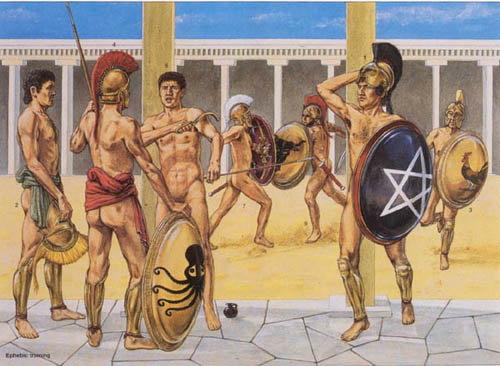
|
the view is from the apodyterium or undressing room |
The first was the palestra or fight school.
Which was used both for athletics -- primarily wrestling -- and for military training.
And in which nudity was the norm.
And we can only imagine what that was like for the boys and men who participated in it daily:
The masculinity of men flows from their group. It's like their natural masculinity combines and gets manifold when masculine identified men unite. The camaraderie, mutual understanding, support, playing together, learning the ways of the world as a male, dealing with roughs and toughs of life together --- they all help to develop the natural masculinity that exists within him.
Clearly, this was the ideal environment in which to elicit and promote Natural Masculinity.
Yesterday, Naked Wrestler sent me these pictures:
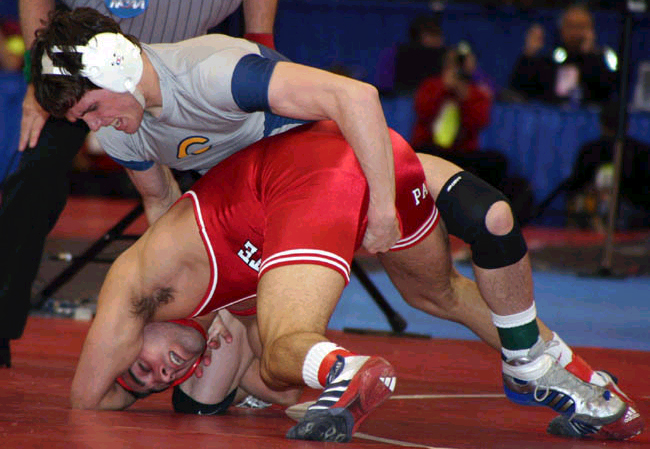
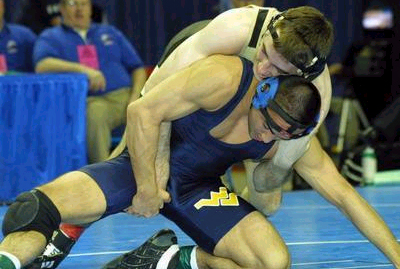
He said: "This is why wrestling is a really man's sport. Guys can grab each other and know how to do it and not really damage each other...."
Right -- and this sort of wrestling and rude rough-housing is all part of the "roughs and toughs of life" that my foreign correspondent spoke of.
Now: try to imagine doing that, daily, with your buds, in the nude.
Try to imagine that level of nude male-male body contact each and every day.
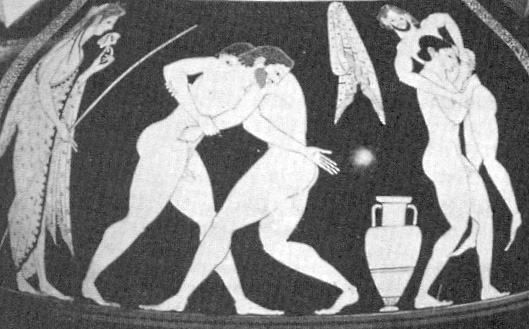
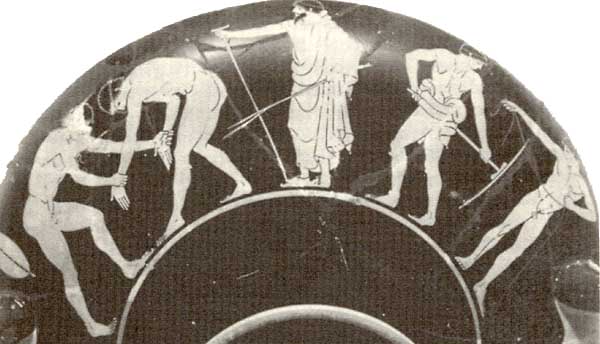
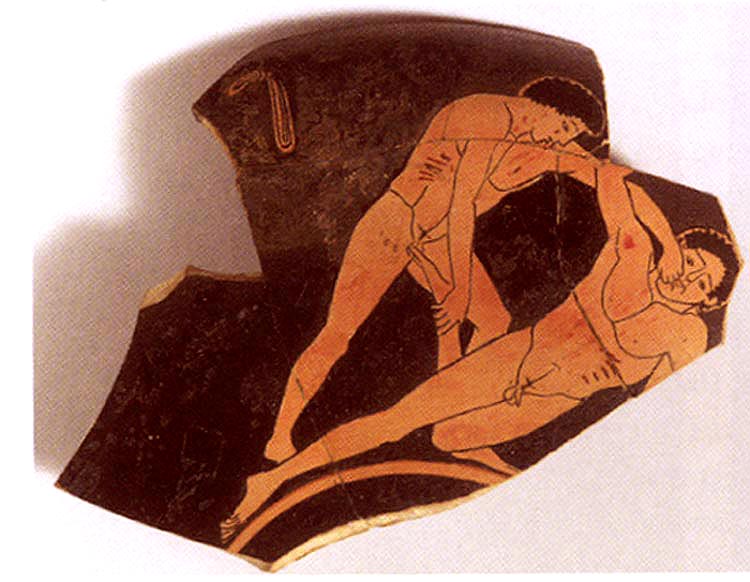
And imagine further that wherever you trained, your training was overseen by this symbol:
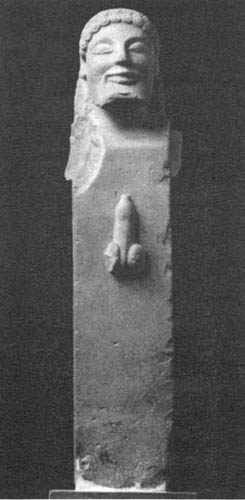
|
The Herm.
A statue of the god Hermes with a full erection.
Which honored and celebrated male sexuality.
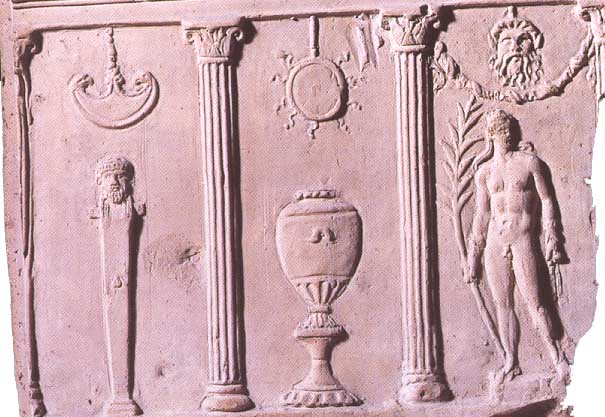
These men wrestled, trained as warriors, competed, fought side by side nude and in the full glory and HONOR of their Manhood -- and it was accepted and expected that many would become lovers.

The other all-male space in the city-states was the eating or dining clubs, which went by different names in different cities.
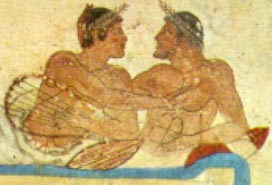
Here's what Grant says about the Spartan version:
During the course of this period [the agogé], at the age of about twenty, they became eligible for one of the Spartan messes or dining clubs, each of which possessed about fifteen members. Their food was awful, but each member had to pay a mess-bill; and failure to pay -- or, for that matter, to endure the severities of the training curriculum -- resulted in deprivation of Spartiate status.
That tells you how important these clubs were to the Spartans.
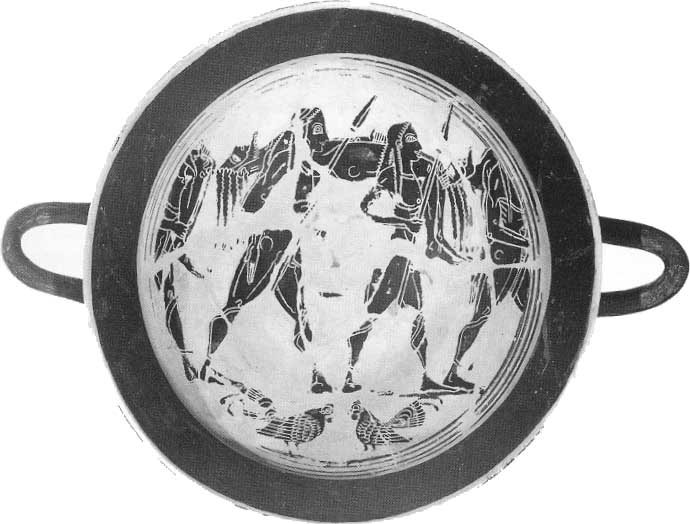
Spartan warriors carry the body of a fallen comrade.
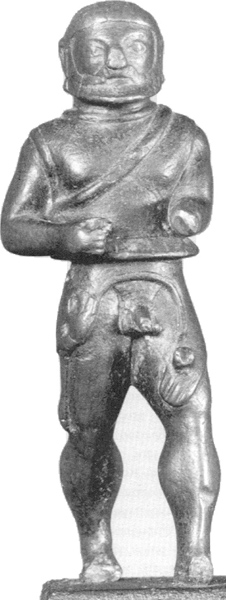
And the Spartan system, though it seems harsh to us, was greatly admired by the other Greeks.
So this was a culture which supported in every way imaginable the development of natural masculinity.
And we can see in Ancient Greece, that the development of that natural masculinity led to what was arguably the most creative and vibrant culture the world has ever known.
What happens, by contrast, under heterosexualization?
Two things.
First of all, there is the creation of a "gay space":
Again, my foreign friend:
The social classification of "sexual orientation" which is actually a social mechanism to isolate male-male sexual behavior from heterosexual spaces and group it with the third sex under a combined 'homosexual' label, takes away this much needed right from a masculine identified boy who is strongly in touch with his same-sex feelings.
The heterosexual society has artificially engineered such a strong hostility for same-sex desires in the straight space that such a boy will automatically psychologically keep out of this group. He may linger on the margins of this space by hiding and suppressing his feelings, which is very stressful.
Thus, in effect, he will not get the chance to hang around with the guys as an 'equal', to play sports with them, to grow with them like normal boys should. Thus he will not know how to relate with masculine men --- or how to relate with others as a masculine man. He will have an underdeveloped masculinity --- something which in nature he is entitled to.
Just like association with masculine identified males is essential for a masculine identified male, and enhances his natural masculinity several times, association with feminized males can seriously deplete his natural masculinity, even pave the way for an unnatural development and effeminacy.
Thus when a masculine identified young man associates himself with the gay group --- psychologically made to believe he is one of them --- he will find himself a misfit in the strongly third-sex gay culture. But since there is no other social space for him, he will force himself to relate with the gays.
The entire experience will subdue his natural masculinity and make him more effeminate. Although he will still be 'macho', compared to the real gays.
So first of all, masculine boys and men with strong same-sex feelings will be forced into an effeminized space, a space which is completely wrong for them and which destroys their natural masculinity.
And secondly, under heterosexualization, the masculine man is harmed by having his NATURAL same-sex needs suppressed:
It must be emphasized that even though in natural conditions masculine male groups are extremely helpful for masculine identified men, because of a lot of social manipulation, and unless guided in the positive direction, they can develop a man's masculinity in the negative direction -- which is destructive for the self and others. It can also harm the individual by making him suppress his same-sex needs which are the basis of a man's natural positive masculinity.
So: "same-sex needs are the basis of a man's natural positive masculinity."
The suppression of those needs under a false masculinity HARMS the individual -- and his culture.
Among the Greeks this didn't happen.
Men were free to, and indeed encouraged to, express their same-sex needs.
They were also able to marry and have children.
Natural Masculinity flowered, and was celebrated.
Many years ago, I wrote:

Heroic Homosex
Athenian Warriors and Lovers
Who Died in Battle and Were Buried TogetherThis Athenian stele or grave marker presents a striking image from a culture of heroic homosex.
These men are lovers and soldiers who were killed during the Peloponnesian War and buried together. They're a pretty typical same-sex couple of the period. One has a beard, which indicates he's older, but clearly the difference in their ages is not great.
Athens was a pretty brutal place. It was a major slave society - one of the things that destroyed Greek democracy was the expansion of slavery - and it was almost constantly at war with other city states.
But it was also intensely creative. And who can compare the life of an American "gay man" - surrounded by material luxury and immersed in anal, promiscuity, and effeminacy - to that of an ancient Greek - barefoot and, by our standards, poor, but part of a great and ennobling culture, which admired and celebrated Masculine, Manly, love.
Are you searching for your hero?
If you are I support you, as I do everyone in the Alliance who seeks his Warrior Brother.
Our heterosexualized American culture belittles that quest. But that culture is dead wrong.
American culture is intensely materialistic and so worships death. It's a culture that is unconscionably destructive - it eats its children and destroys its Men.
Our task is to oppose it. To say no to it.
To challenge it at every turn by living our own, true, warrior lives.

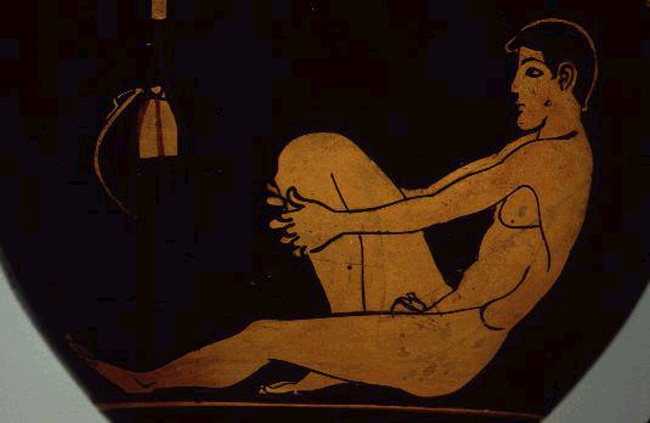


AND
Warriors Speak is presented by The Man2Man Alliance, an organization of men into Frot
To learn more about Frot, ck out What's Hot About Frot
Or visit our FAQs page.

| What's Hot About Frot | Hyacinthine Love | THE FIGHT | Kevin! | Cockrub Warriors of Mars | The Avenger | Antagony | TUFF GUYZ | Musings of a BGM into Frot | Warriors Speak | Ask Sensei Patrick | Warrior Fiction | Frot: The Next Sexual Revolution |
| Heroes Site Guide | Toward a New Concept of M2M | What Sex Is |In Search of an Heroic Friend | Masculinity and Spirit |
| Jocks and Cocks | Gilgamesh | The Greeks | Hoplites! | The Warrior Bond | Nude Combat | Phallic, Masculine, Heroic | Reading |
| Heroic Homosex Home | Cockrub Warriors Home | Heroes Home | Story of Bill and Brett Home | Frot Club Home |
| Definitions | FAQs | Join Us | Contact Us | Tell Your Story |
© All material on this site Copyright 2001 - 2010 by Bill Weintraub. All rights reserved.





